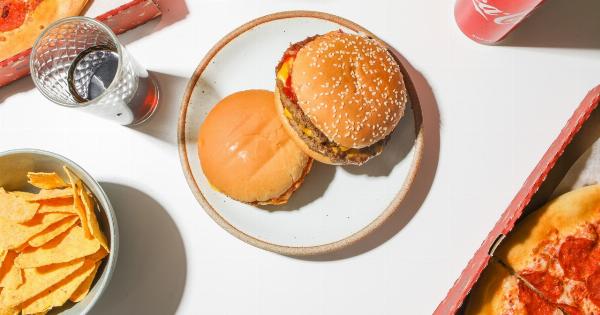When it comes to maintaining good health, a balanced diet plays a crucial role. However, not all foods are beneficial for our well-being. Some foods have been linked to an increased risk of cancer.
By being aware and making informed choices, you can protect your health and reduce your risk of developing this devastating disease. In this article, we will explore some cancer-causing foods and how you can avoid them.
1. Processed Meats
Processed meats such as sausages, hot dogs, bacon, and deli meats are known to contain various chemicals and preservatives. These include nitrates and nitrites, which are used to enhance shelf life and add flavor.
However, when these meats are cooked, especially at high temperatures, these compounds can react and form carcinogenic substances called nitrosamines. Numerous studies have linked the consumption of processed meats to an increased risk of colorectal and stomach cancers.
It is advisable to limit your intake of processed meats and opt for healthier alternatives like lean meats, poultry, or plant-based proteins.
2. Sugar-Sweetened Beverages
Excessive consumption of sugar-sweetened beverages such as soda, energy drinks, sweetened juices, and sports drinks has been associated with obesity, type 2 diabetes, and certain types of cancer.
These beverages are loaded with added sugars, which not only contribute to weight gain but also promote the growth of cancer cells. Cutting back on sugary drinks and opting for water, herbal tea, or freshly squeezed juices can make a significant difference in reducing your cancer risk.
3. Charred and Grilled Foods
While grilling can be a popular cooking method, it is important to be cautious about the charred or grilled parts of the food.
When meats, poultry, or fish are cooked at high temperatures and produce charring or blackening, they can form heterocyclic amines (HCAs) and polycyclic aromatic hydrocarbons (PAHs). These compounds have been linked to an increased risk of colorectal, pancreatic, and prostate cancers.
To minimize your exposure to these harmful substances, you can marinate your proteins, opt for lean cuts of meat, and avoid excessive charring by using indirect heat or pre-cooking the food partially.
4. Artificial Sweeteners
Artificial sweeteners, such as aspartame, saccharin, and sucralose, are commonly used as sugar substitutes in various products labeled as “diet” or “sugar-free.” While they may seem like a healthy alternative, studies have shown that long-term consumption of artificial sweeteners can have negative health effects. Some research suggests a possible link between artificial sweeteners and an increased risk of developing certain cancers, although further studies are needed to establish a definitive connection.
It is best to limit your intake of artificial sweeteners and opt for natural sweetening options like stevia or moderate amounts of natural sugars.
5. Highly Processed Snacks
Highly processed snacks, such as chips, cookies, crackers, and packaged baked goods, often contain unhealthy ingredients like refined grains, trans fats, artificial flavors, and preservatives.
These snacks not only contribute to weight gain but also lack the necessary nutrients for maintaining good health. Additionally, the high levels of processed carbohydrates in these snacks can lead to chronic inflammation, which is a known factor in the development of cancer.
To keep yourself healthy, choose whole, unprocessed snacks like fresh fruits, nuts, or homemade snacks made from wholesome ingredients.
6. Hydrogenated Oils
Hydrogenated oils, also known as trans fats, are artificially created fats commonly found in fried foods, fast food, margarine, and many processed snacks. These oils increase the risk of developing various diseases, including cancer.
Trans fats are known to promote inflammation and negatively affect heart health. To protect your health, it is important to read food labels and avoid products that contain hydrogenated or partially hydrogenated oils. Instead, opt for healthier fats like olive oil, avocado oil, or coconut oil when cooking or preparing meals.
7. Canned Foods
Canned foods are convenient, but they often come with health risks.
Many canned foods are lined with a substance called bisphenol A (BPA), which is known to interfere with hormonal balance and has been linked to an increased risk of breast and prostate cancers. When possible, choose fresh or frozen fruits and vegetables instead of canned options. If you do opt for canned foods, look for BPA-free options, or consider switching to glass or other alternative packaging materials.
8. Alcohol
Excessive alcohol consumption is a well-established risk factor for various types of cancer, including those of the liver, breast, colon, and throat.
Alcohol can increase the production of acetaldehyde, a harmful metabolite, and also impair the body’s ability to absorb essential nutrients and eliminate cancer-causing agents. Limiting alcohol intake or avoiding it altogether can significantly lower your risk of developing alcohol-related cancers.
9. Red and Processed Meats
Red meats, such as beef, pork, and lamb, have been linked to an increased risk of colon, rectal, and pancreatic cancers. Processed red meats, as mentioned earlier, pose an even greater risk.
If you consume red meat, choose lean cuts, trim off visible fat, and moderate your intake. Opt for healthier protein sources like fish, poultry, legumes, or plant-based proteins as alternatives.
10. Non-Organic Produce
Conventionally grown produce is often treated with pesticides, herbicides, and other chemicals to protect against pests and maximize crop yield.
These chemicals can leave residues on the fruits and vegetables we consume, and some have been linked to an increased risk of cancer. To reduce your exposure to harmful chemicals, consider choosing organic produce whenever possible. Organic farming practices avoid the use of synthetic pesticides and chemicals, making it a healthier choice for you and the environment.
By being aware of these cancer-causing foods and making healthier choices, you can protect your health and reduce your risk of developing cancer. Remember to prioritize a balanced diet, rich in fruits, vegetables, whole grains, and lean proteins.
Additionally, adopting a physically active lifestyle, maintaining a healthy weight, and avoiding tobacco and excessive sun exposure are essential steps for cancer prevention.



























